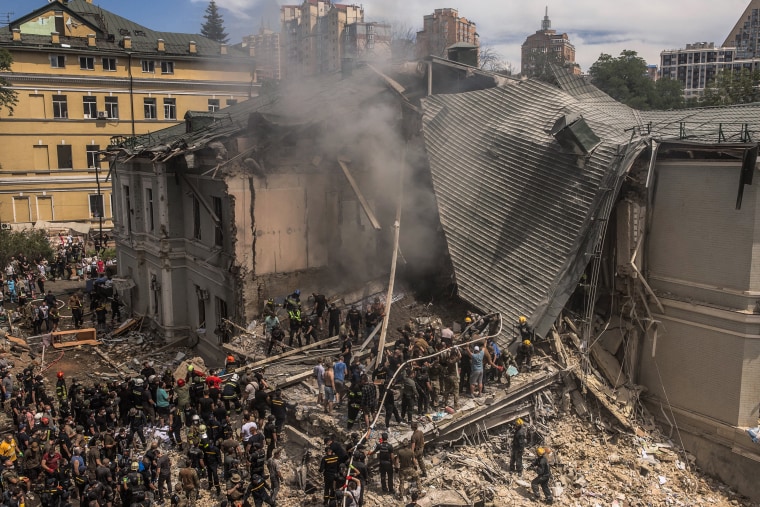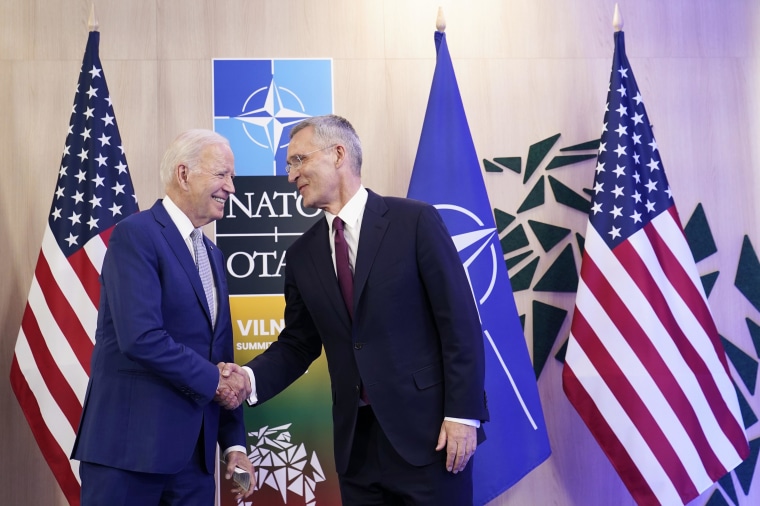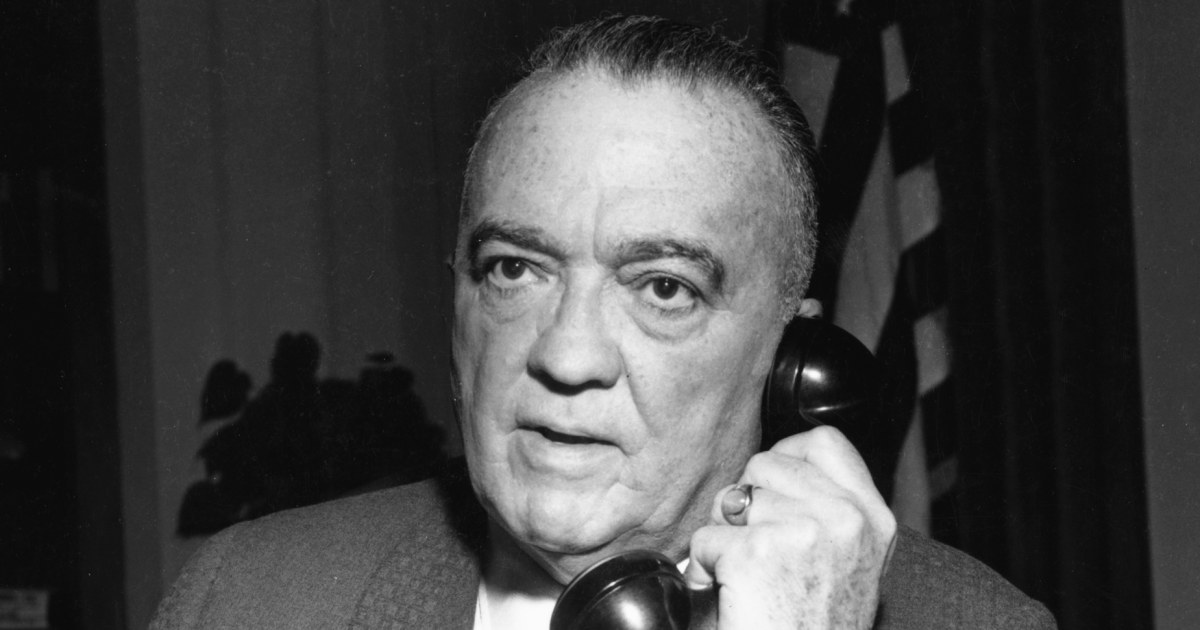IRANS BAD DAY GETTING WORSE
Efforts to salvage the Iranian frigate IRIS Sahand, which capsized in the port of Bandar Abbas, have failed.
The ship was lifted and moved to another area, but the cables holding it broke, causing it to capsize again. It is now fully submerged in… https://t.co/ZIp5NBn0E9 pic.twitter.com/Qo3Me2Yhec
— Open Source Intel (@Osint613) July 9, 2024
Day: July 9, 2024
As NATO leaders meet in Washington this week, Ukraine’s future is hanging in the balance.
Despite vows by alliance leaders to keep arming Ukraine in its fight to fend off invading Russian forces, the prospect of Donald Trump’s returning to the White House is casting a shadow over the summit.
A Trump victory in the November presidential election could mean a dramatic decline in U.S. aid to Ukraine and American political pressure on Kyiv to bow to Russian demands in any peace talks, Western officials say.
Trump has long avoided criticism of Russia’s invasion and questioned the value of the NATO alliance. His political allies have expressed skepticism about the large U.S. military aid packages provided to Ukraine.
Former national security aides to Trump have proposed a peace plan that would require major concessions from Ukraine, including forsaking the possibility of NATO membership for the foreseeable future.
Trump has offered no details about his position on Ukraine, other than to promise to bring the war to an end “before I even arrive at the Oval Office, shortly after we win the presidency.” But he has not explained how he would end the war.
On a June podcast, Trump was asked whether he would rule out Ukraine’s eventual membership in NATO. He replied that promising membership to Ukraine was a “mistake” and “really why this war started,” comments that seemed to echo Moscow’s talking points about the conflict.
In a statement, Trump campaign communications director Steven Cheung said, “President Trump has repeatedly stated that a top priority in his second term will be to quickly negotiate an end to the Russia-Ukraine war. President Trump believes European nations should be paying more of the cost of the conflict, as the U.S. has paid significantly more, which is not fair to our taxpayers. “
“The war between Russia and Ukraine never would have happened if Donald J. Trump were President. So sad.”
Republican Sen. JD Vance of Ohio, considered a possible running mate for Trump, has argued against sending tens of billions of dollars’ worth of weapons to Ukraine. In opposing the aid package Congress approved in April, Vance said that it would not be enough to shift the course of the war and that America’s defense industry could not produce enough weapons to meet Ukraine’s needs.
Trump’s campaign has said any policy proposals made by his supporters or former advisers are not endorsed by Trump.
European officials say exactly what Trump would do on Ukraine remains an open question, as his team has avoided offering any specifics about his plans. But they are worried.
The growing anxiety among European allies about a Trump victory is “completely understandable,” said John Herbst, a former ambassador to Ukraine and now a senior fellow at the Atlantic Council think tank. “Trump is something of a wild card.”
Ukrainian government officials seeking continued U.S. support have had to navigate a partisan minefield over the past year and have grown frustrated that the issue of arming Kyiv has become a pawn in America’s domestic politics.
They have viewed the Biden administration’s approach as too slow and too cautious, delaying the arrival of badly needed weapons. But they also fear what a second Trump presidency could mean for their cause, Western officials say.
For Kyiv, Trump’s plans are a mystery, said William Taylor, a career diplomat who was ambassador to Ukraine under President George W. Bush and briefly charge d’affaires in Kyiv under Trump.
“They’re not entirely sure — no one is really sure — what former President Trump would do,” said Taylor, now with the U.S. Institute for Peace think tank.
Congress adopted the military aid package in April after months of delay, with a group of pro-Trump Republican lawmakers blocking its approval. But when Congress finally voted on the proposal, Trump did not weigh in publicly. Senate Minority Leader Mitch McConnell, R-Ky., credited Trump’s public silence with helping get the aid across the finish line.
A majority of Americans continue to support arming Ukraine, according to a new survey from the Ronald Reagan Presidential Foundation and Institute, with 57% in favor, 32% opposed and 11% unsure. The poll results were nearly identical to those of a survey conducted a year ago.

Although Ukraine has been able to blunt a major Russian offensive near Kharkiv with weapons from the U.S. and European countries, its troops are outnumbered by Russia’s large ground force, and it is struggling to maintain its air defenses against a relentless Russian bombardment of missiles and drones.
On Monday, Russia launched the heaviest aerial attack on Kyiv in four months, striking a children’s hospital in the capital and other targets across the country, killing dozens of people and injuring more than 120, officials in Ukraine said.
To help Ukraine defend itself, NATO member states are prepared to pledge this week to keep spending about $43 billion a year on military equipment for Ukraine, NATO Secretary-General Jens Stoltenberg said last week.
“I expect allies will decide at the summit to sustain this level within the next year,” Stoltenberg told reporters.

The Biden administration and other European governments are expected to make announcements at the NATO summit this week about new military hardware for Ukraine, including possibly more Patriot missile defense systems, fighter jets and other weapons.
As for Ukraine’s future security arrangements, U.S. and European officials say they hope to hammer out a statement at the summit promising an “irreversible” path to NATO membership for Kyiv.
But that language may not be enough to secure Ukraine’s place in the NATO alliance if Trump is elected, said Tamar Jacoby, the Kyiv-based director of the New Ukraine Project at the Progressive Policy Institute think tank.
“If you want to be in the West, you have to be tied to the West, and indeed, you have to be ultimately protected by the West. And so, in a way, NATO membership is the most important thing that Ukrainians are fighting for,” Jacoby said.
NATO countries should adopt a binding measure that would guarantee Ukraine’s eventual membership in the alliance, to protect Ukraine after any possible armistice negotiated between Kyiv and Moscow, she said.
“If ever there was a time to Trump-proof a path into NATO for Ukraine, this would be the moment,” Jacoby said.
#OTD July 9,1958 date of #CIAmemo for Russian language edition of #Doctor_Zhivago. Operation codenamed #AEDINOSAUR pic.twitter.com/orb7M2evGT
— SPIES&VESPERS (@SpiesVespers) July 9, 2024
Donald Trump wants to control the Justice Department and FBI … Russian spy plot to sow ‘panic and terror’ in US … GOP Lawmaker Gets Mountain Of Mockery … The Coming Russian Escalation With the West https://t.co/DeHsYhmtRF pic.twitter.com/YjHqmVJ73E
— Michael Novakhov (@mikenov) July 9, 2024

@mikenov: Trump and FBI
Trump and FBI – Google Search https://t.co/vDbElbNYpK
– https://t.co/UBwCgKqV5O— Michael Novakhov (@mikenov) July 9, 2024
@mikenov: Trump and FBI
Trump and FBI – Google Search https://t.co/vDbElbNYpK
— Michael Novakhov (@mikenov) July 9, 2024
Latest Stories from The Associated Press / Prosecutor tells New York City jury at bribery trial that Sen. Bob Menendez put power ‘up for sale’ https://t.co/wJHq6vMn2d
— Michael Novakhov (@mikenov) July 9, 2024

There’s been much talk about the gravity and impact of this month’s Supreme Court finding granting a former U.S. president presumptive immunity for “official” acts, and absolute immunity when exercising “core constitutional powers.” In the oral arguments preceding this decision, and in the dissenting opinion of Justice Sonia Sotomayor, the justices raised the scenario of a president getting away with ordering Navy SEALS to kill a political opponent, using the military to stage a coup or accepting a bribe in exchange for a pardon. Chief Justice John Roberts called his colleagues’ remonstrations “extreme hypotheticals” and” fearmongering.”
Chief Justice John Roberts called his colleagues’ remonstrations “extreme hypotheticals” and” fearmongering.”
There was nothing extreme in Sotomayor’s concerns, and her fears were justified. As a national security analyst, with 25 years as an FBI agent, I know we don’t need to engage in hypotheticals to lay out this ruling’s likely consequences. All we need to understand what a criminally immune Trump might do, with even one executive branch agency given carte blanche, is to remind ourselves what the nation learned about the FBI during the 1970s.
The great unraveling started in 1971, when a group of peace activists broke into a small FBI office in Media, Pa., and stole whatever files they could carry out. They suspected that the FBI was spying on anti-Vietnam war protestors, especially on college campuses. The files confirmed their suspicions, but unsure of what exactly they were looking at, they handed some of the files to reporters. One journalist, then-NBC reporter Carl Stern, was intrigued by a code word in the files: “COINTELPRO.” It would take years of dogged reporting, lawsuits to uncover documents and a number of congressional committee inquiries to fully learn the details of FBI Director J. Edgar Hoover’s secret counterintelligence program to covertly address anything and anyone deemed to be a threat by Hoover or the presidents he served under.
For over a year, a special Senate committee chaired by Idaho Democrat Frank Church conducted 800 interviews, demanded documents and held public and closed-door hearings. What they learned shocked the nation. The Church Committee and other investigations confirmed that the FBI, the CIA and the NSA had been unlawfully spying on American citizens.
The FBI, with the approval of Attorney General Robert F. Kennedy, and later with the encouragement of President Lyndon Johnson, illegally wiretapped Martin Luther King Jr. and other civil rights leaders. The FBI sent a letter to King, using details uncovered in the wiretap, essentially blackmailing King and suggesting he kill himself. There were countless other “black bag jobs” where the FBI, without court authorization, broke into people’s homes, took evidence, opened and read mail, and planted microphones — all outside the law, because someone in power deemed those American citizens to pose some kind of threat.
Hoover claimed the Black Panther Party was “the greatest threat to internal security of the United States.” (It wasn’t.)
In 1968 and into the 1970s, Hoover claimed the Black Panther Party was “the greatest threat to internal security of the United States.” (It wasn’t.) Hoover discussed the Black Panthers with then-President Richard Nixon and got the green light to go after them, when, as Nixon directed, “you sort of had the scent of the smell of a national conspiracy thing. You know, the kind of thing like the Panthers, and all that … ” The FBI developed an informant to penetrate the Panthers’ Illinois chapter. In the evening of Dec. 3, 1969, the informant drugged Fred Hampton, one of the chapter’s rising leaders. Chicago police officers, coordinating with the bureau, raided Hampton’s apartment and fatally shot him as he slept.
Unsurprisingly, these sorts of actions did not stop at the Panthers. Nixon ordered the FBI to unlawfully wiretap members of the media without benefit of lawful court orders, simply because Nixon didn’t like those reporters. And, during the Watergate scandal, he ordered the CIA to tell the FBI to end their investigation into the illegal break-in directed by Nixon’s campaign.
Remember, it was Nixon who infamously said during an interview, “When the president does it, that means it is not illegal.” Nixon’s assertion was wrong back in the 1970s. Yet, with this month’s court ruling on absolute immunity, an American president can make that declaration with a straight face. If a president is acting within his Constitutional powers, they can tell the FBI to do almost anything to suppress any “threat” — real or imagined, political or not.
According to a Reuters report, Trump’s allies are already planning to give their candidate direct control of DOJ and the FBI so that they will no longer function independent of the White House. “Two prominent Trump allies told Reuters they support eliminating the FBI’s general counsel” — the office that flashes a red light whenever the bureau is about to do something unlawful. If that red light is removed, there’d be nothing standing between a president and a crime spree.
Do Sotomayor’s hypotheticals seem “extreme” now? They shouldn’t, because we’ve already “been there, done that” as a nation.
The Church Committee’s findings resulted in numerous regulations and policies that established guardrails to prevent the FBI and other intelligence agencies from unlawfully spying on Americans. The committee also established the Foreign Intelligence Surveillance Act (FISA) court to ensure that federal judges approve all national security wiretaps and covert search warrants. Today, a president could tell the FBI to ignore the formalities of the FISA court and simply spy on his enemies — without fear of criminal liability.
Do Sotomayor’s hypotheticals seem “extreme” now? They shouldn’t, because we’ve already “been there, done that” as a nation. If none of this troubles you, you’re not paying attention. Because some day, a president you don’t support can designate you, your friends, your employer or your favorite organization or news platform a threat. That president could direct the FBI to spy on those entities and people, and you won’t know about it until it’s too late. It’s happened before, and it can happen again.
